- About
- Admissions
-
Academics
- Undergraduate Programs
- Pre-Major
-
Departments
- Overview
- Art Program
- Biblical Studies, Christian Ministries, Intercultural Studies & Philosophy Department
- Biology Program
- Business Department
- Chemistry Department
- Communication Department
- Computer Science & Engineering Department
- Education Department
- Engineering Program
- English Program
- Environmental Science & Sustainable Development Program
- Film & Media Program
- History, Global & Political Studies Department
- Kinesiology Department
- Mathematics Department
- Modern Languages Program
- Music Program
- Physics Program
- Psychology Department
- Social Work Program
- Sociology Program
- Theatre & Dance Program
- Liberal Arts
- Study Abroad
- Graduate Programs
- Online Programs & Licensures
- Special Programs
- Academic Enrichment Center
- Life at Taylor
Info For
Education Team Teaches Literacy, Trains Teachers in Belize
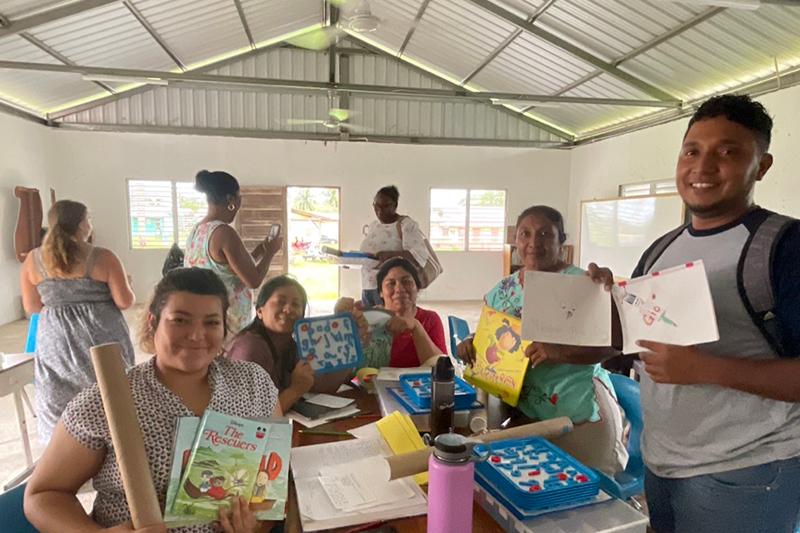
Taylor means relationships. From classes to the way we do residence life, from student jobs to athletics, it’s true of everything that happens on campus. And relationships are the heartbeat of the many cross-cultural academic and service experiences offered here.
In early August, Education professors Christy Moore and Quinn White traveled to Belize with a group of five Elementary Education students to facilitate professional development training with teachers at two public schools. These were the same schools she and a larger group of Taylor students had served at in January, during an academic J-term trip for the Diversity in the Classroom course.
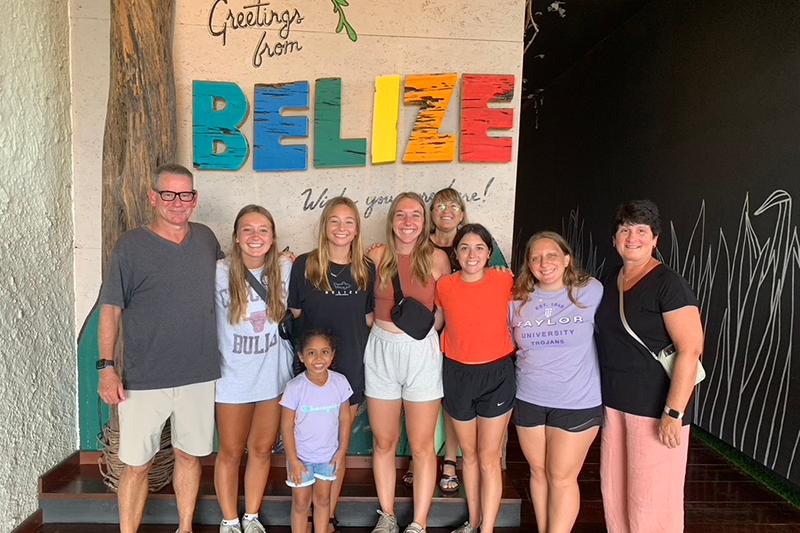
The school principals had been so impressed at the team’s quality of work, in some cases teaching kids to read who had reached the equivalent of 2nd grade with little to no literacy, that they extended the invitation to return. When Moore asked what they could do to support the schools, she was told one of the biggest needs they had was professional development for teachers.
J-Term in Belize
Belize is a small Central American country that’s part of the British Commonwealth. Because of its colonial past, English is the official language used in schools. However, many students speak other languages in their homes, such as Spanish, Creole, or Garifuna. But because English is the teaching language, it’s an ideal place for Taylor University Education students to practice what they are learning, while also gaining powerful cross-cultural experiences.
“Our students encounter a lot of the same things in Belize that they’ll experience in American classrooms: poverty, multilingual students, etc.,” said Moore. “They saw how good instruction can go a long way in overcoming challenges to literacy.”
Moore set the stage for building relational bridges from the first day they started working at the schools in January. She made the decision that the Taylor students would walk to the schools where they were working, rather than drive in a van.
“It was about a mile and a half each way with lots of hills,” she said. “But we got to meet students and their families on their walks. It got to the point where students were waiting for us before and after school so we could all walk together. We got all sweaty and dirty with them. Developing those relationships was key.”
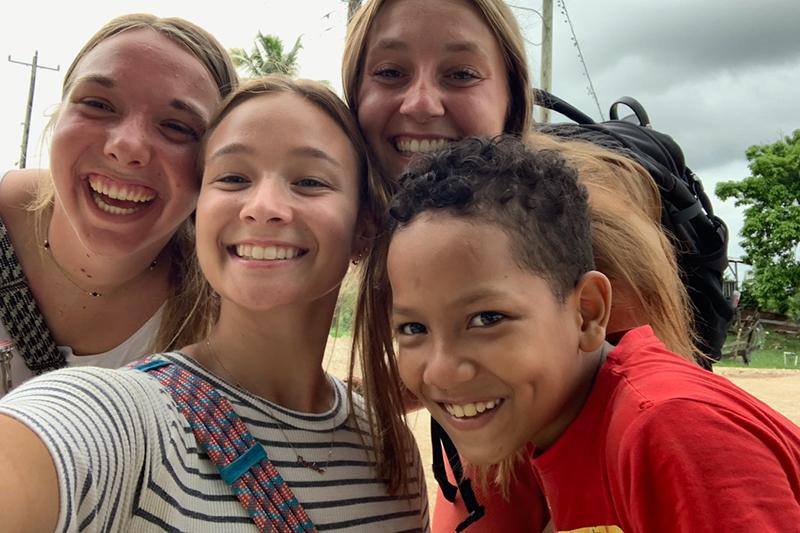
Moore said one of the biggest challenges for students in Belize to learn to read was lack of books and teaching tools in the schools. Between the humid climate that destroys books and the poverty of the schools, many teachers had only a handful of classroom books. They relied on writing words on a chalkboard, which students would then copy, to teach kids to read.
“It's hard to teach kids to read when they don’t have books,” said Moore. “We could have just sent money for them to buy books and supplies, but teachers need to know how to use them effectively, and what strategies really work.”
Isabelle Heuser ‘24 was assigned to a group of kids who were struggling the most with reading.
“I used methods and strategies to help them start recognizing letters and sight words, and over the course of the month, they started to read and write more fluently,” she said. “When the teachers saw how beneficial our lessons were, they invited us to come back and help inform more teachers.”
Professional Development for Teachers
Over the spring semester, Moore, White, and a group of five students worked on designing professional development workshops for over 30 teachers from two different schools. They were able to secure funding to purchase books, supplies, and other literacy tools that they gave to the teachers.
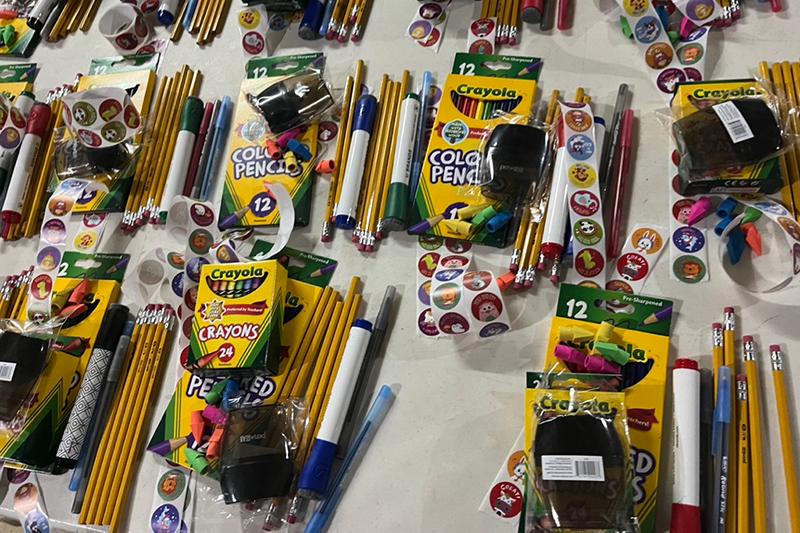
While in Belize, they addressed key issues in education including helping students who are very far behind, moving beyond rote memory as a teaching tool, and demonstrating new methods and strategies in literacy development.
“The teachers, students, and staff in Belize that we served do not have all the same resources, supplies, knowledge, or support that we do here in the United States,” said Caroline Hanback ‘24. “However, that does not keep them from teaching as well as they can, learning as best as they can, or serving people around them as best as they can. What a beautiful depiction of being like Christ they were to me in this week that we spent with them!”
Although both schools are part of the public school system in Belize, they are both faith-affiliated and can share biblical truths in class.
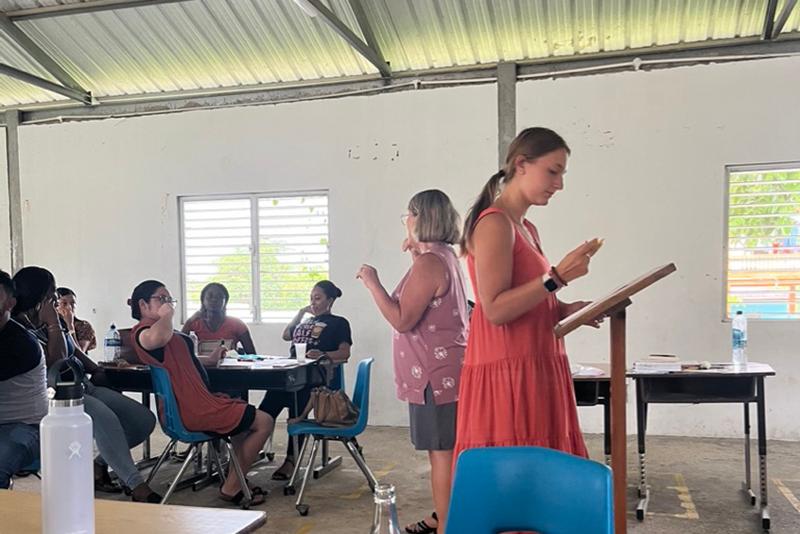
“We talked about ways to integrate our faith into reading lessons. It was eye-opening for them to see how they can share about Christ through read-aloud children’s books and discussions,” said Moore.
Because Taylor University received approval from the Belize Ministry of Education, the workshop hours were able to count towards the teacher’s continuing education credits, at no cost to them. A partnering organization, Oaks of Righteousness, that makes meals for the children during school, provided meals for the teachers during the workshop which further alleviated financial burden.
With a few extra days at the end of their trip, the Taylor students blessed both schools with some freshly painted hopscotch tiles for kids to play with during recess.
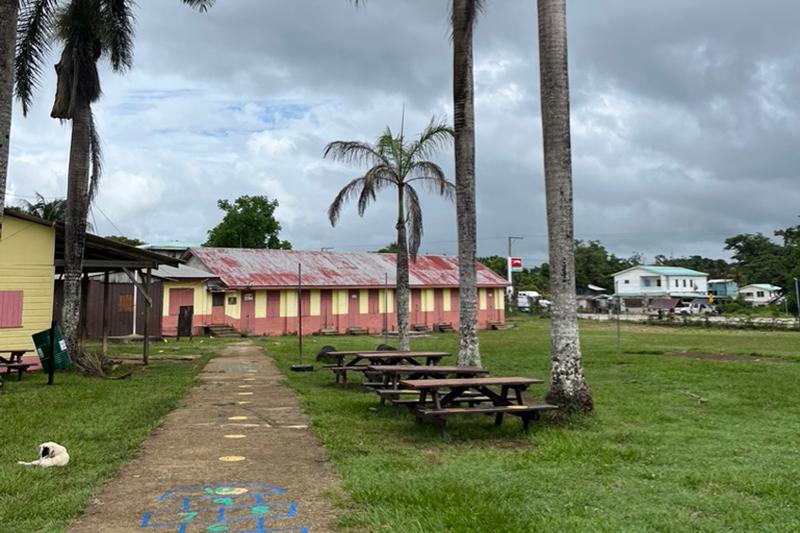
Moore is anticipating returning to these schools again in January. For her students, even those who will not be returning with her, the connection to Belize continues because several students now sponsor children through Body and Soul, another partnering organization that has a child sponsorship program.
Nicole DeBruin '25 not only began sponsoring a child, but she recruited her parents to sponsor a student as well. These sponsorships pay for fees, supplies, backpacks, and meals at school.
“God taught me how deep joy and heartache can co-exist,” said DeBruin. “There is such simplicity within Belize that is absolutely beautiful and brings people great joy. Amidst this joy is deep heartache for the poverty, safety issues, lack of necessities, dangerous environments, and the list goes on. It has been a huge blessing in my life to go to Belize, and each time I leave I feel filled with deep joy and heartache for the experiences I have had and the people I have met. The Lord meets me in this and reminds me that He sees us in our joy and heartache, and He sits with us in it. “
Study Elementary Education at Taylor University
Taylor’s Education Department has a proven track record for preparing teachers to excel in the classroom. From your freshman year, you’ll be in local classrooms gaining powerful experiences that will give you a strong start as a teacher. Start your application today, or schedule a campus visit to learn more.

